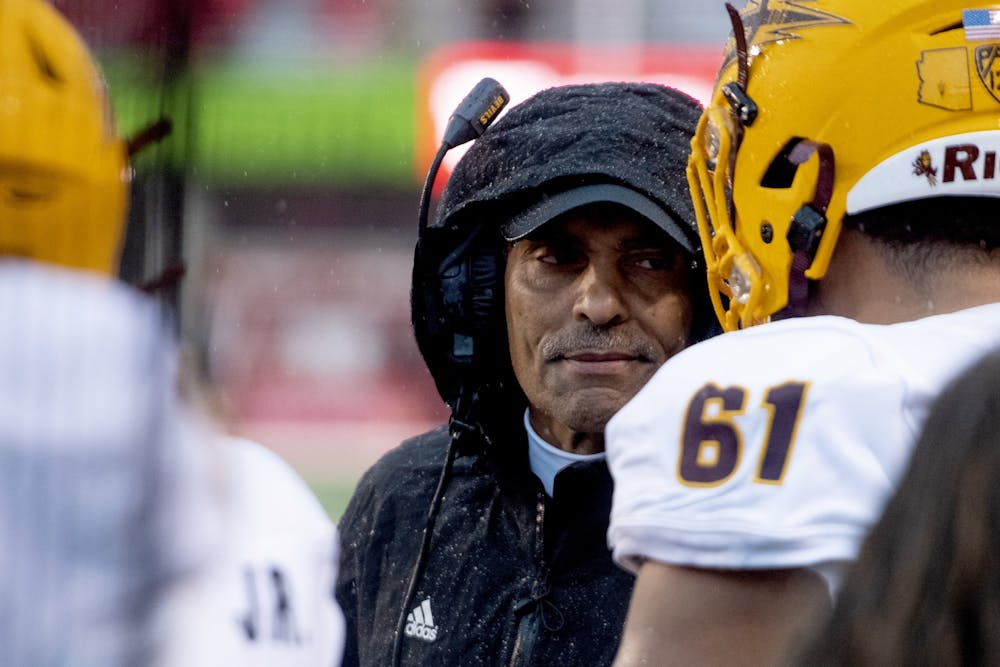When ASU football coach Herm Edwards was young, he started keeping tabs on lessons he learned throughout his life.
He had a beat-up, three-ring notebook crammed with teachings, sayings and observations he had acquired growing up, going to college, playing in the NFL and eventually coaching. Edwards said he filled it with notes that meant something to him and could teach others someday.
"If you come to my office, you'll see folders and binders just of notes," Edwards said. "I look back on things and go, 'I wrote this down a year ago, and it applies right now.'"
Shelley Smith, a writer at ESPN, read a New York Times article on Edwards, who was the head coach of the New York Jets at the time. In the story, one part stood out to her in particular.
“In the article, (Edwards) said he has a book with the lessons in it,” Smith said. “So I called him like, ‘Give it to me, let me write a book.’"
In 2005, their collaboration, “You Play to Win the Game,” was published.
The book is laid out just like Edwards’ notebook with each lesson as its own heading, some of which he continues to preach to his players.
'Find and focus'
In the book, he uses sports analogies to portray the message, like focusing on a new football season.
“Identify a goal and create a plan," Edwards said. "If you don't have a plan, then you don't know which way to go."
Edwards has used this lesson in a turbulent 2020, having conversations of racial injustice throughout the summer with his team.
ASU's head coach shared that he wants his players to speak out on these issues. But he requests students to study what they want to speak about.
"We challenge our athletes to not stand in silence when moments of injustice and racism appear," Edwards said. "We encourage them to use their platforms to be a voice and a voice of reason with solutions to move America forward. Be a voice of reason with solutions.”
That message resonated with sophomore tight end Nolan Matthews.
He, along with freshman defensive back T Lee and redshirt freshman defensive back Jordan Clark, was involved in an incident at a Tempe Whataburger. A customer yelled racial obscenities after they asked if she could order for them at the drive-thru.
Matthews made a statement about the inequality he and others face in the U.S. after several incidents of racial injustice occurred across the country.
“(Edwards) said it's my responsibility and duty to speak out for these sorts of things,” Matthews said. “He also said there's no problem with me speaking out, he's going to back me 100%. But, just make sure that I know what I'm talking about. If I'm doing interviews or get questions, I know what I'm talking about. I'm educated on the topic."
Matthews said he bought four books over the summer to further educate himself on racism and law. He said whenever he talks to Edwards, he can tell how educated Edwards is, which has taught him to approach issues the same way.
“It just gives us a life lesson of being a man, you have to be prepared with everything you talk about and educate yourself,” Matthews said. “That's what I really respected about him, his teaching us that.”
'Don't be afraid of what you don't know'
Edwards’ book indirectly pointed out one of the problems that led to Matthews speaking out in a section called “Don't Be Afraid of What You Don't Know.” He highlighted how ignorance could lead to fear, danger and unwarranted panic.
Edwards shared that many problems people of color face are prejudices other people have due to a lack of personal growth and education.
“When you grow up, there's always this piece of you that is influenced by the people you allow in your circle,” Edwards said. “The problem with that is if they all feel the same way, conversations always have the same outcome. There's no debate. There's no knowledge being received. So, you don't grow. You grow old, but you don't grow in knowledge.”
He tied this to the Black Lives Matter movement, saying those who have formed opinions of a subject before reading something can "hijack your message."
“Because of the platform that people have, everyone has this platform, if they don't like your message, they can throw a curveball and somebody will listen like ‘Oh, that's what it means,’" Edwards said. "And then before you know it, you have all these different messages, and they're missing the point.”
'Sometimes, it's all about the fighting'
An analogy Edwards made about societal change is pushing a boulder. Unlike flipping a light switch, change comes from continuously fighting the boulder to make it go to where one wants it to. That push does not stop.
"You can't be afraid to challenge something," Edwards said in the book. "It is important, though, to pick your battles because fighting can be exhausting."
Edwards has seen the fight since his upbringing in the 1960s. But, the way that his players' generation has taken on the fight feels different than in the past.
"Where I get my energy is I see the young people now, and I go, 'This is different,'" Edwards said on a Zoom call with students in early September. "This is going to work; they're going to make a change."
All three headings from his book may be on different pages, but they show a correlation. To combat ignorance, within oneself or society, fight it with an educated plan.
Reach the reporter at alexjweiner@gmail.com and follow @alexjweiner on Twitter.
Like State Press Sports on Facebook and follow @statepresssport on Twitter.




